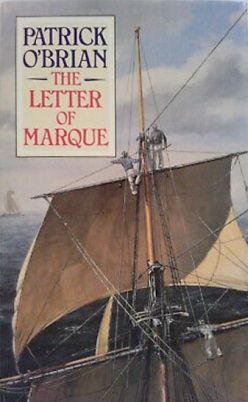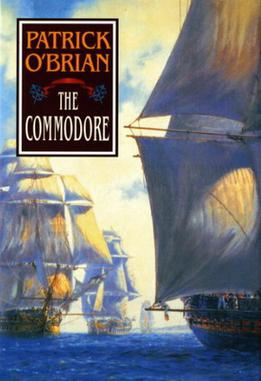
Gothic fiction, sometimes called Gothic horror in the 20th century, is a loose literary aesthetic of fear and haunting. The name is a reference to Gothic architecture of the European Middle Ages, which was characteristic of the settings of early Gothic novels.

Historical fiction is a literary genre in which the plot takes place in a setting related to the past events, but is fictional. Although the term is commonly used as a synonym for historical fiction literature, it can also be applied to other types of narrative, including theatre, opera, cinema, and television, as well as video games and graphic novels.

Patrick O'Brian, CBE, born Richard Patrick Russ, was an English novelist and translator, best known for his Aubrey–Maturin series of sea novels set in the Royal Navy during the Napoleonic Wars, and centred on the friendship of the English naval captain Jack Aubrey and the Irish–Catalan physician Stephen Maturin. The 20-novel series, the first of which is Master and Commander, is known for its well-researched and highly detailed portrayal of early 19th-century life, as well as its authentic and evocative language. A partially finished 21st novel in the series was published posthumously containing facing pages of handwriting and typescript.

Master and Commander is a 1969 nautical historical novel by the English author Patrick O'Brian, first published in 1969 in the US and 1970 in the UK. The book proved to be the start of the 20-novel Aubrey–Maturin series, set largely in the era of the Napoleonic Wars, on which O'Brian continued working until his death in 2000.
Genre fiction, also known as popular fiction, is a term used in the book-trade for fictional works written with the intent of fitting into a specific literary genre, in order to appeal to readers and fans already familiar with that genre.
British literature is literature from the United Kingdom of Great Britain and Northern Ireland, the Isle of Man, and the Channel Islands. This article covers British literature in the English language. Anglo-Saxon literature is included, and there is some discussion of Latin and Anglo-Norman literature, where literature in these languages relate to the early development of the English language and literature. There is also some brief discussion of major figures who wrote in Scots, but the main discussion is in the various Scottish literature articles.

The first Irish prose fiction, in the form of legendary stories, appeared in the Irish language as early as the seventh century, along with chronicles and lives of saints in Irish and Latin. Such fiction was an adaptation and elaboration of earlier oral material and was the work of a learned class who had acquired literacy with the coming of Latin Christianity. A number of these stories were still available in manuscripts of the late medieval period and even as late as the nineteenth century, though poetry was by that time the main literary vehicle of the Irish language.
The Aubrey–Maturin series is a sequence of nautical historical novels—20 completed and one unfinished—by English author Patrick O'Brian, set during the Napoleonic Wars and centring on the friendship between Captain Jack Aubrey of the Royal Navy and his ship's surgeon Stephen Maturin, a physician, natural philosopher, and intelligence agent. The first novel, Master and Commander, was published in 1969 and the last finished novel in 1999. The 21st novel of the series, left unfinished at O'Brian's death in 2000, appeared in print in late 2004. The series received considerable international acclaim, and most of the novels reached The New York Times Best Seller list. These novels comprise the heart of the canon of an author often compared to Jane Austen, C. S. Forester and other British authors central to English literature.

HMS Surprise is the third historical novel in the Aubrey–Maturin series by Patrick O'Brian, first published in 1973. The series follows the partnership of Captain Jack Aubrey and the naval surgeon Stephen Maturin during the wars against Napoleon's France.

Post Captain is the second historical novel in the Aubrey–Maturin series by Patrick O'Brian, first published in 1972. It features the characters of Captain Jack Aubrey and naval surgeon Stephen Maturin, and is set in the early 19th century during the Napoleonic Wars.

The Reverse of the Medal is the eleventh historical novel in the Aubrey-Maturin series by Patrick O'Brian, first published in 1986. The story is set during the Napoleonic Wars and the War of 1812.

The Letter of Marque is the twelfth historical novel in the Aubrey–Maturin series by Patrick O'Brian, first published in 1988. The story is set during the Napoleonic Wars and the War of 1812.

The Commodore is the seventeenth historical novel in the Aubrey-Maturin series by British author Patrick O'Brian, first published in 1995. The story is set during the Napoleonic Wars and the War of 1812.

Charles Robert Maturin, also known as C. R. Maturin, was an Irish Protestant clergyman and a writer of Gothic plays and novels. His best known work is the novel Melmoth the Wanderer.

Clara Reeve was an English novelist best known for the Gothic novel The Old English Baron (1777). She also wrote an innovative history of prose fiction, The Progress of Romance (1785). Her first work was a translation from Latin, then an unusual language for a woman to learn.
Edward Maturin was born in Dublin, Ireland, on 18 June 1812 and died in New York City on 25 May 1881. He was naturalised as an American and worked as a professor of Greek. His fiction and poetry generally dealt with historical themes, while his work as a Gothic novelist often had an Irish background.
Anne Fuller was an Irish novelist in the Gothic genre. She was one of the earliest women writers of Gothic fiction.
Irish Gothic literature developed in the eighteenth and nineteenth centuries. Most of the writers were Anglo-Irish. The period from 1691 to 1800 was marked by the dominance of the Protestant Ascendancy, Anglo-Irish families of the Church of Ireland who controlled most of the land. The Irish Parliament, which was almost exclusively Protestant in composition, passed the Penal Laws, effectively disenfranchising the Catholic majority both politically and economically. This began to change with the Acts of Union 1800 and the concomitant abolition of the Irish Parliament. Following a vigorous campaign led by Irish lawyer Daniel O'Connell, Westminster passed the Roman Catholic Relief Act 1829 removing most of the disabilities imposed upon Catholics.

The type of romance considered here is mainly the genre of novel defined by the novelist Walter Scott as "a fictitious narrative in prose or verse; the interest of which turns upon marvellous and uncommon incidents", in contrast to mainstream novels which realistically depict the state of a society. These works frequently, but not exclusively, take the form of the historical novel. Scott's novels are also frequently described as historical romances, and Northrop Frye suggested "the general principle that most 'historical novels' are romances". Scott describes romance as a "kindred term", and many European languages do not distinguish between romance and novel: "a novel is le roman, der Roman, il romanzo".

Leixlip Castle is an 1825 short story by the Irish writer Charles Maturin. His final work, it was published posthumously. Maturin's earlier novels had been heavily Gothic in tone. With his previous work The Albigenses (1824) he switched moved towards historical stories in the style of Walter Scott's popular Waverley novels. In Leixlip Castle he combined both elements in a supernatural story concerning Ireland in the early 18th century. It should not be confused with a novel of the same title by M.L. O'Byrne published in 1883.













